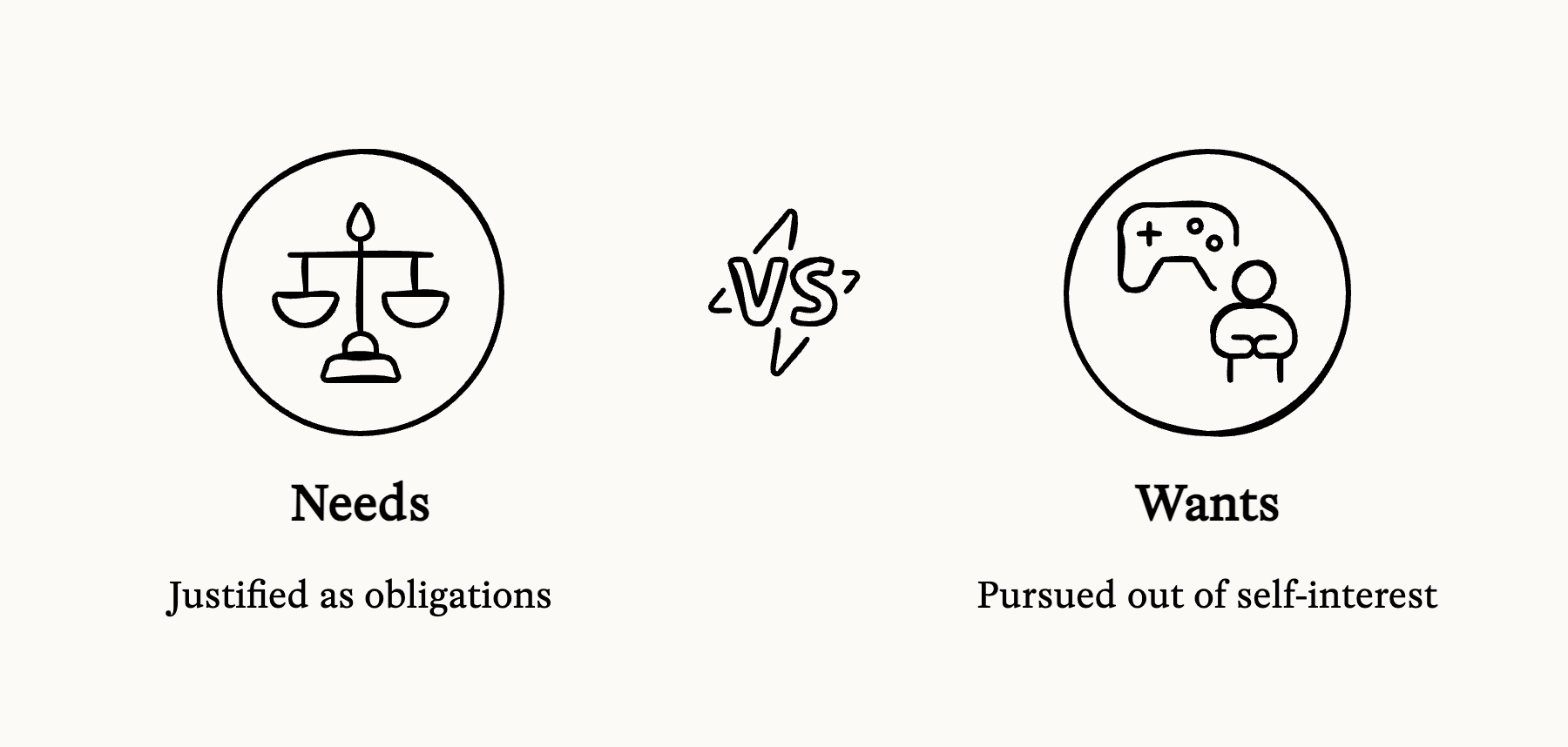How Founders Lose Sight of What They Want
Written by Dave Bailey

When you’re drowning in obligations, it’s almost impossible to know what you really want. If you’re struggling to separate wants vs. needs, this simple exercise will help you get clear fast.
Founders rarely say this in public, but behind closed doors I hear it a lot:
“To be honest, Dave, I don't even know what I want anymore.”
It’s especially common among founders who suddenly realise they’re not even sure what they want from their own business.
When you’ve spent years answering to investors, customers, your team, and your family, it’s easy to lose the thread of what you actually want.
Most of the time, when a founder says, “I don’t know what I want,” what they actually mean is:
I don’t know how to justify what I want.
In practice, they only feel allowed to want something if they can dress it up as necessary.
Needs vs. Wants
The difference between a want and a need, as I learned from Dan Sullivan, is how you justify it.

A need is something you justify as an obligation:
- “I need to grow revenue so I can raise a Series B.”
- “I need to implement a new system in order to drive performance in my team.”
- “I need to spend time in this area because I'm the bottleneck.”
- As a founder, obligations come with the job.
But a want is different.
A want is something you’re pursuing purely out of self-interest:
- “I want to redesign my role to be more fun.”
- “I want my company to pursue a bolder, more ambitious strategy.”
- “I want to take more vacations with my family.”
- These are often things you find enjoyable, or that mean something to you.
You’d think wanting is easy, but it’s not.
Self-interest is often confused with selfishness, so many people talk themselves out of wanting anything without a 'defensible' justification.
And to make things worse, other people keep asking you to justify your wants:
- Them: “Why do you need to reach that ambitious goal?”
- You: “I don’t need to... I want to.”
- Them: “But why?”
- You: “Because I want to.”
That’s the point of a want: it’s something you want because you want it. There’s no need to defend it, justify it, or seek permission from anyone else.
Why Wants Are Important
The problem with focusing 100% on needs and ignoring your wants is that you eventually become resentful.
Resentment is the feeling you get when you don’t say something.
When you don't say what you want to others (and even yourself), you’re very unlikely to get it.
By default, you end up optimising for everyone else: investors, team, customers, “the business”… anyone but you.
You can’t always get what you want. But if you’re a founder, you usually can—as long as you’re willing to find a creative solution to get it.
The first step is clarifying what you want in the first place.
How to Clarify Your Wants
Wanting is a skill—and like any skill, it takes practice.
Start by confronting this question:
What do you want that you don’t have?
Write down a few answers and don’t censor yourself. You’re allowed to want anything, without justification.
Frankly, if what you write seems a bit unreasonable, that’s a good sign you’re on the right path.
Here are some examples of some wants I heard recently:
- “I want to refocus my company on AI.”
- “I want to free up a day a week just to think and process.”
- “I want to move to San Francisco.”
- “I want to spend my time on building stuff, not people problems.”
- “I want to hire someone to look after the day-to-day.”
Next, once you have something on your list, mentally run through this role play:
- You: “I want ___.”
- Them: “Why do you need it?”
- You: “I don’t need it. I want it.”
- Them: “But why?”
- You: “Because I want it.”
I recommend saying this out loud in front of a mirror. It may sound weird, but it can actually change your brain chemistry.
Finally, get curious about how you could make some of these wants work.
We often jump to the conclusion they’re impossible given our current obligations, when in fact they’re quite possible—if you treat them as important.
Ultimately, you’re allowed to want things, and to represent your wants.
And often, knowing what you want is enough to get it.
Related Reading
- How to Find Your Purpose at Work
- How to Resolve a Conflict Where Both Sides Are Right
- Three Principles to Staying Sane While Running a Startup
Originally published on November 12, 2025.
How do top founders actually scale?
I’ve coached CEOs for 10,000+ hours—here’s what works.
Join 17,000+ founders learning how to scale with clarity.
Unsubscribe any time.




